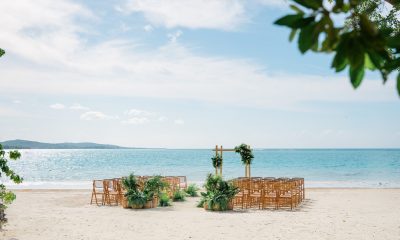Featured
Local Advocate to Attend International Transgender Symposium in Thailand
Jenetta Marie Johnson, an African American Transgender advocate, wants to go to Bangkok, Thailand to be a voice for incarcerated Transgenders and especially Transgenders of color at a symposium she says is dominated by the white and wealthy Transgenders.
Johnson, who represents Transgender GenderVariant Intesex Justice Project, has been invited to be on a panel at the 24th World Professional Association for Transgender Health International Symposium in Thailand. The organization promotes evidence based care, education, research, advocacy, public policy and respect in transgender health.
Webster’s defines gender as a societal or behavioral aspect of sexual identity. The term Transgender (TG) is actually an umbrella term that encompasses a variety of gender expressions including, cross-dresser, bi-gender, and transsexual and according to Johnson the list continues to grow.
Estimates show that the TG population makes up only one to five percent of the general population, while the population is highly vulnerable and marginalized, facing discrimination commonly, when seeking to obtain basic necessities, such as employment, housing, and healthcare.
Common are reports of violence and harassment, even from their own family members. It is directly because of these and other factors that transgenders, especially transgenders of color, experience severe health disparities including HIV.
The Transgender GenderVariant Intesex Justice Project is located in Oakland, providing assistance to Transgenders, transwomen of color who are in incarcerated and those getting out of custody.
Johnson wants the chance to speak about incarcerated TG people and their health needs.
“I’m thrilled to have the opportunity to attend, and I truly believe in my heart that I can make a difference by sharing my experience with the medical and mental health providers who will also be attending,” she said. “My goal in attending (the symposium) is to speak directly about the needs and issues faced by transgender people in prisons.”
She says that their organization, receives over 25 letters a month from TG inmates complaining about physical and sexual abuse behind bars.
Johnson has been through some bumpy roads herself, 13 and years in Florida prisons, for drug distributing. She looked for help but had difficulty finding services for Transgenders in Florida.
In 1997, Johnson came to the Bay It was in San Francisco that she blossomed, she said, getting educated, empowered, finding a place of worship. She soon became a service provider, helping others with the issues she had overcome.
At least 5,000 transgenders persons are estimated to call the Bay Area their home.
At the symposium in Bangkok, professionals, scientist and Transgender advocates from all over the world will gather together to present the latest advances in research, education, clinical service, and advocacy to promote the health and well being of transgender and transsexual people and their families.
Topics that will be addressed are primary care, psychiatry, endocrinology and surgery, gender and sexuality, speech and voice therapy, as well as other issues relevant to transgender heath.
They will also make recommendations to The World Health Organization (WHO), a specialized agency of the United Nations, who is in the process of developing the latest edition of the International Classification of Diseases (ICD), which is the standard set of definitions of diseases and health conditions used throughout most of the world.
Activism
OP-ED: AB 1349 Puts Corporate Power Over Community
Since Ticketmaster and Live Nation merged in 2010, ticket prices have jumped more than 150 percent. Activities that once fit a family’s budget now take significant disposable income that most working families simply don’t have. The problem is compounded by a system that has tilted access toward the wealthy and white-collar workers. If you have a fancy credit card, you get “presale access,” and if you work in an office instead of a warehouse, you might be able to wait in an online queue to buy a ticket. Access now means privilege.

By Bishop Joseph Simmons, Senior Pastor, Greater St. Paul Baptist Church, Oakland
As a pastor, I believe in the power that a sense of community can have on improving people’s lives. Live events are one of the few places where people from different backgrounds and ages can share the same space and experience – where construction workers sit next to lawyers at a concert, and teenagers enjoy a basketball game with their grandparents. Yet, over the past decade, I’ve witnessed these experiences – the concerts, games, and cultural events where we gather – become increasingly unaffordable, and it is a shame.
These moments of connection matter as they form part of the fabric that holds communities together. But that fabric is fraying because of Ticketmaster/Live Nation’s unchecked control over access to live events. Unfortunately, AB 1349 would only further entrench their corporate power over our spaces.
Since Ticketmaster and Live Nation merged in 2010, ticket prices have jumped more than 150 percent. Activities that once fit a family’s budget now take significant disposable income that most working families simply don’t have. The problem is compounded by a system that has tilted access toward the wealthy and white-collar workers. If you have a fancy credit card, you get “presale access,” and if you work in an office instead of a warehouse, you might be able to wait in an online queue to buy a ticket. Access now means privilege.
Power over live events is concentrated in a single corporate entity, and this regime operates without transparency or accountability – much like a dictator. Ticketmaster controls 80 percent of first-sale tickets and nearly a third of resale tickets, but they still want more. More power, more control for Ticketmaster means higher prices and less access for consumers. It’s the agenda they are pushing nationally, with the help of former Trump political operatives, who are quietly trying to undo the antitrust lawsuit launched against Ticketmaster/Live Nation under President Biden’s DOJ.
That’s why I’m deeply concerned about AB 1349 in its current form. Rather than reining in Ticketmaster’s power, the bill risks strengthening it, aligning with Trump. AB 1349 gives Ticketmaster the ability to control a consumer’s ticket forever by granting Ticketmaster’s regime new powers in state law to prevent consumers from reselling or giving away their tickets. It also creates new pathways for Ticketmaster to discriminate and retaliate against consumers who choose to shop around for the best service and fees on resale platforms that aren’t yet controlled by Ticketmaster. These provisions are anti-consumer and anti-democratic.
California has an opportunity to stand with consumers, to demand transparency, and to restore genuine competition in this industry. But that requires legislation developed with input from the community and faith leaders, not proposals backed by the very company causing the harm.
Will our laws reflect fairness, inclusion, and accountability? Or will we let corporate interests tighten their grip on spaces that should belong to everyone? I, for one, support the former and encourage the California Legislature to reject AB 1349 outright or amend it to remove any provisions that expand Ticketmaster’s control. I also urge community members to contact their representatives and advocate for accessible, inclusive live events for all Californians. Let’s work together to ensure these gathering spaces remain open and welcoming to everyone, regardless of income or background.
Activism
Oakland Post: Week of December 31, 2025 – January 6, 2026
The printed Weekly Edition of the Oakland Post: Week of – December 31, 2025 – January 6, 2026

To enlarge your view of this issue, use the slider, magnifying glass icon or full page icon in the lower right corner of the browser window.
Activism
Big God Ministry Gives Away Toys in Marin City
Pastor Hall also gave a message of encouragement to the crowd, thanking Jesus for the “best year of their lives.” He asked each of the children what they wanted to be when they grow up.

By Godfrey Lee
Big God Ministries, pastored by David Hall, gave toys to the children in Marin City on Monday, Dec. 15, on the lawn near the corner of Drake Avenue and Donahue Street.
Pastor Hall also gave a message of encouragement to the crowd, thanking Jesus for the “best year of their lives.” He asked each of the children what they wanted to be when they grew up.
Around 75 parents and children were there to receive the presents, which consisted mainly of Gideon Bibles, Cat in the Hat pillows, Barbie dolls, Tonka trucks, and Lego building sets.
A half dozen volunteers from the Big God Ministry, including Donnie Roary, helped to set up the tables for the toy giveaway. The worship music was sung by Ruby Friedman, Keri Carpenter, and Jake Monaghan, who also played the accordion.
Big God Ministries meets on Sundays at 10 a.m. at the Mill Valley Community Center, 180 Camino Alto, Mill Valley, CA Their phone number is (415) 797-2567.
-

 Bay Area4 weeks ago
Bay Area4 weeks agoPost Salon to Discuss Proposal to Bring Costco to Oakland Community meeting to be held at City Hall, Thursday, Dec. 18
-

 Activism4 weeks ago
Activism4 weeks agoMayor Lee, City Leaders Announce $334 Million Bond Sale for Affordable Housing, Roads, Park Renovations, Libraries and Senior Centers
-

 Activism4 weeks ago
Activism4 weeks agoOakland Post: Week of December 10 – 16, 2025
-

 Activism4 weeks ago
Activism4 weeks agoOakland School Board Grapples with Potential $100 Million Shortfall Next Year
-

 Arts and Culture4 weeks ago
Arts and Culture4 weeks agoFayeth Gardens Holds 3rd Annual Kwanzaa Celebration at Hayward City Hall on Dec. 28
-

 Activism4 weeks ago
Activism4 weeks ago2025 in Review: Seven Questions for Black Women’s Think Tank Founder Kellie Todd Griffin
-

 Advice4 weeks ago
Advice4 weeks agoCOMMENTARY: If You Don’t Want Your ‘Black Card’ Revoked, Watch What You Bring to Holiday Dinners
-

 Activism4 weeks ago
Activism4 weeks agoAnn Lowe: The Quiet Genius of American Couture





















































